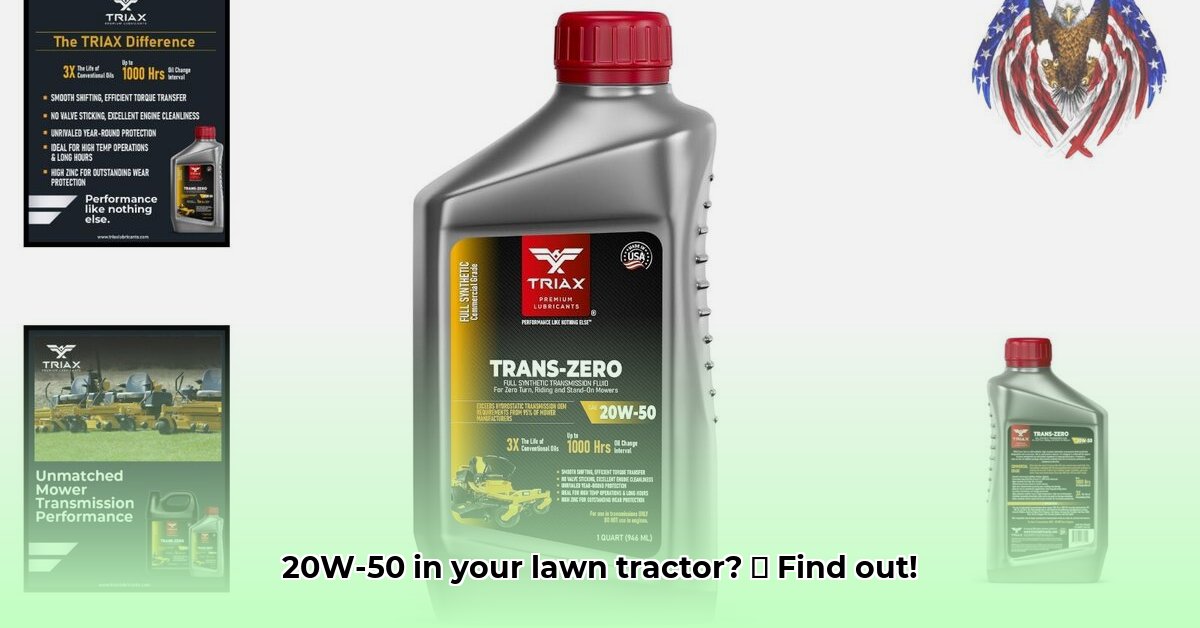
So, you're wondering if that 20W-50 oil in your garage is suitable for your lawn tractor. The short answer is: maybe, but it's generally not ideal. For a new lawn tractor, see this guide for your first oil change. This guide will explain why, helping you choose the right oil to keep your lawnmower running smoothly for years to come.
Understanding Oil Viscosity: Decoding the Numbers
The numbers on your oil bottle (like 10W-30 or 20W-50) represent the oil's viscosity, or thickness. Think of it like this: 10W-30 is like maple syrup – it flows easily. 20W-50 is more like honey – thicker and slower. The "W" stands for winter. The first number indicates how well the oil flows in cold temperatures (lower is better). The second number shows the oil's thickness when hot (higher means thicker).
In air-cooled lawn mower engines, the oil's viscosity is crucial. Too thick an oil creates extra friction, increasing operating temperatures and potentially leading to engine damage. This is especially important considering air-cooled engines already struggle to dissipate heat effectively compared to their liquid-cooled counterparts.
Why 20W-50 Might Not Be Ideal for Your Lawn Tractor
Using 20W-50 in your lawnmower could lead to several problems:
- Increased Friction and Wear: The thicker oil increases friction within the engine, causing increased wear on moving parts. This is like constantly running your engine under a heavier load, leading to faster deterioration.
- Higher Operating Temperatures: Because of the added friction, the engine works harder, leading to higher operating temperatures. This is particularly detrimental to air-cooled engines, which are more susceptible to overheating.
- Reduced Fuel Efficiency: Your engine has to work harder to overcome the increased resistance from the thicker oil, resulting in a slight, but noticeable, reduction in fuel economy.
For most lawn tractors, the benefits of 20W-50's added protection are outweighed by these drawbacks.
Recommended Oil Viscosities for Your Lawn Tractor
Selecting the right oil viscosity depends on several factors, notably your climate and engine type. Always refer to your owner's manual for specific recommendations! However, here's a general guideline:
| Climate | Engine Condition | Recommended Oil Viscosity | Notes |
|---|---|---|---|
| Moderate (50-80°F) | New/Good | 10W-30, SAE 30 | Excellent for most situations in mild climates. |
| Hot (Above 80°F) | New/Good | 10W-40, 15W-40 | Provides better protection at higher temperatures. |
| Cold (Below 50°F) | Any | 5W-30 (multi-grade) | Ensures easy starting in cold weather. |
| Hot (Above 80°F) | Older/Higher Mileage | 15W-40, 20W-40 | May consider 20W-50 only if explicitly permitted in your owner's manual. |
Isn't it important to understand the specific needs of your engine? Yes! Using the wrong oil viscosity can severely shorten your engine's lifespan.
Choosing the Right Oil: Type and Beyond
Beyond viscosity, consider the oil type:
- Conventional Oil: Less expensive, but typically has a shorter lifespan and offers less protection than synthetic oil.
- Synthetic Oil: More expensive, but offers superior performance, protection, and longevity, especially in extreme temperatures and demanding situations. Synthetic blends offer a compromise between price and performance.
Always consult your owner's manual for specific oil recommendations.
Changing Your Lawn Tractor's Oil: A Step-by-Step Guide
Regular oil changes are vital for engine health. Always consult your owner's manual for specific instructions, but here's a general overview:
- Warm-up (slightly): Run the engine briefly to warm the oil, making it easier to drain. Allow it to cool slightly before working with it.
- Drain the Old Oil: Position a drain pan, remove the drain plug, and let the old oil drain completely.
- Replace the Oil Filter (if applicable): Install a new oil filter.
- Refill with New Oil: Add the recommended amount of new oil according to your manual.
- Check the Oil Level: Use the dipstick to ensure the oil level is correct.
- Dispose of Waste Properly: Recycle your used oil responsibly.
Conclusion: Prioritize Regular Maintenance
Using the correct oil viscosity and type, combined with regular oil changes, will significantly extend your lawn tractor's lifespan and maintain its peak performance. Neglecting these steps can lead to costly repairs and premature engine failure. Always remember to consult your owner's manual for specific instructions and recommendations – it's your most valuable resource.